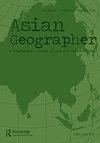Documenting the evolution and expansion of surface urban heat in the Bangkok Metropolitan Region, 2000–2019
IF 2.2
Q2 GEOGRAPHY
引用次数: 3
Abstract
ABSTRACT The evolution of land surface temperatures (LSTs) within the Bangkok Metropolitan Region (BMR) is examined with respect to patterns of urbanization from 2000 to 2019. Change detection as well as examinations of five periods within the 20 years yield insights into the spatial patterning of surface urban heat (SUH) within the BMR. Results suggest that the LSTs in portions of the BMR have increased more than 5°C during the 20-year period. The spatial distribution of SUH exhibits a pattern where high LSTs occur outward and primarily westward from the urban core along highways serving as development corridors and related regions of rapid urbanization. Nighttime LSTs have not increased as markedly as daytime; however, several noted “hotspots” have intensified over time and are located in districts along the southern seaboard. The greatest LST increase through the 20-year period is located in the northwest of the Bangkok urban core in Bang Kruai and Mueang Nonthaburi. A close investigation of this area indicates that the LST hotspots are co-located with rapid urban expansion into the area that has been facilitated by the destruction of orchards and other agriculture lands from a flood that occurred in 2011. The significant changes in land cover from orchards and agriculture to urban and built-up have led to the large increases in LSTs within the region.记录2000-2019年曼谷大都市区地表热量的演变和扩展
摘要根据2000年至2019年的城市化模式,研究了曼谷大都会区地表温度的演变。变化检测以及对20年内五个时期的检查,可以深入了解BMR内城市地表热(SUH)的空间模式。结果表明,在20年的时间里,BMR部分地区的LST增加了5°C以上。SUH的空间分布呈现出一种模式,即高LST从城市核心向外且主要向西出现,沿着作为发展走廊的高速公路和快速城市化的相关区域。夜间LST没有像白天那样显著增加;然而,随着时间的推移,一些著名的“热点”已经加剧,位于南部沿海地区。20年期间LST增幅最大的地区位于曼谷市中心Bang Kruai和Mueang Nonthaburi的西北部。对该地区的仔细调查表明,LST热点与该地区的快速城市扩张共存,2011年发生的洪水破坏了果园和其他农业用地,这为该地区的城市扩张提供了便利。从果园和农业到城市和建成区,土地覆盖的显著变化导致该地区LST的大幅增加。
本文章由计算机程序翻译,如有差异,请以英文原文为准。
求助全文
约1分钟内获得全文
求助全文
来源期刊

Asian Geographer
GEOGRAPHY-
CiteScore
3.30
自引率
0.00%
发文量
7
期刊介绍:
Asian Geographer disseminates knowledge about geographical problems and issues focusing on Asia and the Pacific Rim. Papers dealing with other regions should have a linkage to Asia and the Pacific Rim. Original and timely articles dealing with any field of physical or human geographical inquiries and methodologies will be considered for publication. We welcome, for example, submissions on people-environment interactions, urban and regional development, transport and large infrastructure, migration, natural disasters and their management, environment and energy issues. While the focus of the journal is placed on original research articles, review papers as well as viewpoints and research notes under the category of “Asian Geography in Brief” are also considered. Review papers should critically and constructively analyse the current state of understanding on geographical and planning topics in Asia. The ‘Asian Geography in Brief’ section welcomes submissions of applied geographical and planning research about Asia. The section aims to showcase (1) the diverse geography and planning of Asia; and (2) the diverse geographical and planning research about Asia. The journal will also publish special issues on particular themes or areas. Book reviews can be included from time to time.
 求助内容:
求助内容: 应助结果提醒方式:
应助结果提醒方式:


